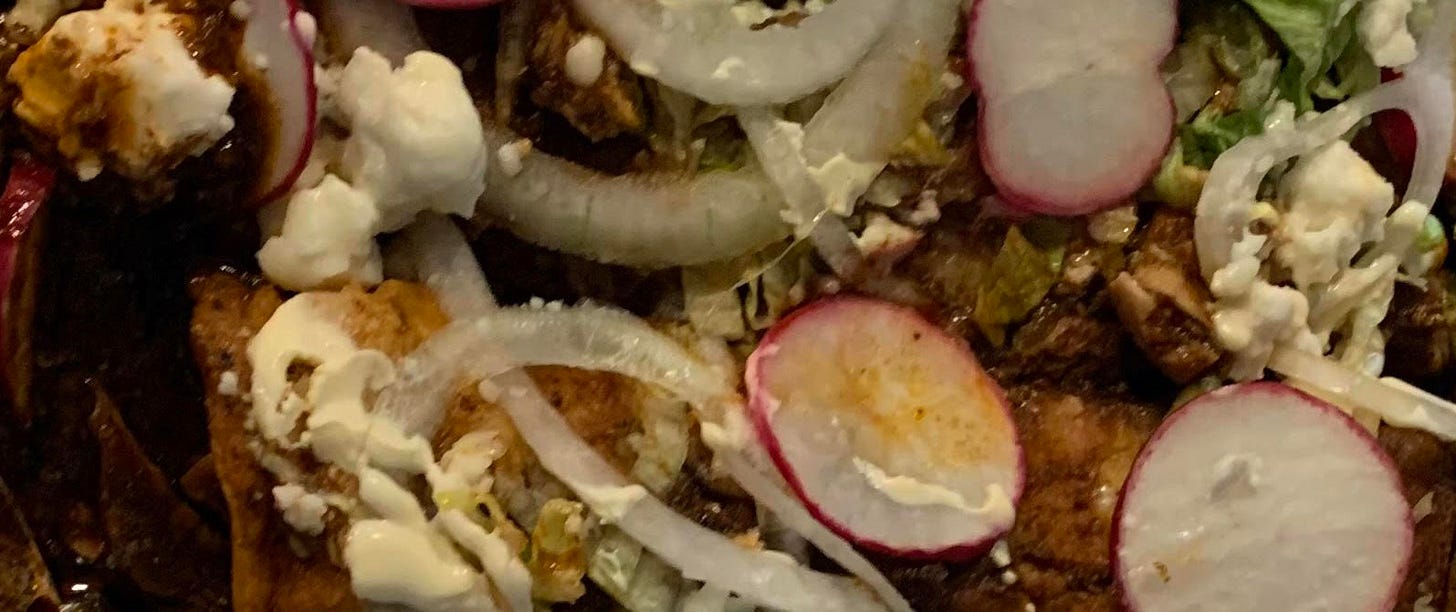Novel nightmares of the novel coronavirus
Meet my new pandemic friend, a bot that collects dreams

It’s hard to imagine a more socially pointless act than mentioning a dream you had on Twitter. Generally, no one cares what you dreamed, and reporting on it unpaid to a crew of strangers seems about as sure a dead end as whispering a secret into a hole in the ground.
Strangely, though, when I did this very thing in November, something echoed back, much as the reeds that grow over buried secrets are said to whisper them back when the wind blows. A bot retweeted my comment to its small group of 500 or so followers. I followed the bot, and since then my timeline has been thick with the accounts of English speakers across the globe, recounting their dreams of coronavirus.
Coronavirus Dreams Bot, or @CovidDreams to its friends, has been blasting out pandemic dreams since March of last year, soon after social restrictions began. It automatically scans for tweets where people mention keywords like “covid,” “coronavirus,” “pandemic,” “social distancing,” plus “had a dream” or “had a nightmare,” etc., and sends them back out to those who follow. To read through its collection, which now amounts to nearly 20,000 tweets, is to catch a glimpse of where our collective unconscious is going at night.
Our pandemic dreams are anxious, funny, frightened, hopeful. Distinct themes emerge. Many people dream about contracting Covid themselves: “I had a dream I was desperately trying not to get Covid from the MyPillow guy,” one writes. Others dream of feeling hemmed into dangerous crowded spaces. Still others describe sunny fantasies from a world before (or after) the virus—pubs, shows, airplanes, vacations, “no covid just vibes.”
Lately the content has swung toward the vaccine that would free us from purgatory. Constantly in the news and currently unobtainable for most people, it clearly occupies a big swath of our psychic space. The vaccine dreams have subgenres of their own. There’s the zombie dream—the vaccine turns you into a zombie, or keeps you from becoming one. There’s the one where you get ahold of the elusive vaccine, until you wake up: “had a dream that a friend slipped me some vaccine doses on the low.” There’s the logistical dream: “I had a dream last night that we expanded vaccine distribution and one of the places you could get them was Arby’s.” Celebrities make appearances—Betty White, The Rock, Nancy Pelosi. “Had a dream Joe Biden gave me my vaccine because he wanted to take a hands on approach,” one person writes.
The man behind the bot remains a little skeptical about just how much you can glean from these dream summaries, which he calls “surface phenomena.” Stefan Marianski, an education officer at the Freud Museum London who is in training as a psychoanalyst himself, started the Covid dreams bot last year as a successor to a Freudian slip bot he created a few years back. As he told me over video chat this week, a psychoanalytic approach would depend on asking what the events of the dream mean to the dreamer—her associations, or the emotion that surrounds the content of the dream. A coronavirus dream “is easy to speculate about, but doesn’t actually come with the kind of material that would situate it in its proper context in terms of the dreamer’s life,” Marianski said. Still, he noted, the dreams do get at common themes, like a pervasive threat of contagion. “The bot came at a moment when people’s concerns about the edges of the body are quite pronounced,” he said.
Despite its Freudian origins, Marianski’s bot actually belongs more to a more sociological tradition of looking at dreams across broad populations. Historian Andrew Burstein, for example, wrote a book (and a piece for the Boston Globe Ideas section, back when I was an editor there) about what decades of recorded dreams reveal about how Americans thought in the past. Other researchers have turned to dreams to understand how people process trauma. One Berkeley psychologist compared the dreams of people who fled California wildfires in 1991 to the dreams of people outside the evacuation zone. He found that people who evacuated but didn’t lose their homes actually had some of the most distressing dreams, compounded by survivor’s guilt, and that the dreams didn’t happen in a vacuum; “post-fire dreams,” he wrote, “reawakened preoccupations with grief from earlier epochs.”
The current pandemic has gone on so long and so globally that psychologists from many countries have already researched, submitted, and published their first papers about our coronavirus dream life. (You can bet there are more to come.) One paper surveyed more than 4000 people on sleep and dreaming early in lockdown and found people were sleeping much more, and with more awakenings and nightmares. The authors searched for word clusters in people’s dream descriptions and turned up what they called “novel, collectively shared COVID-19 bad dream contents,” which included “overcrowding,” “elderly in trouble,” “personal protective equipment,” and “apocalypse.”
What is the point of documenting these dreams, or sharing them with other people? Deirdre Barrett, an assistant professor of psychology at Harvard Medical School who edits the journal Dreaming and published a special portfolio of Covid dreams research this fall, said in a statement that tuning into your Covid dreams can be revealing and potentially cathartic: “Your dreams can make you more aware of just what about the pandemic is bothering you the most,” she said. And talking about them with others can help you understand how many of these concerns and sorrows we share.
That may be why the Coronavirus Dreams Bot is so winning. Marianski mentioned to me that he felt slightly concerned it would feel invasive for a bot to automatically rebroadcast these tweets, many from people not expecting much of an audience for their personal dream musings. But to me it felt welcome, I told him—a little bot coming to sit with me and to tell me that the strangers I now almost never encounter in person are, just like me, navigating the bleak emotional tides of pandemic times with whatever surreal dream logic our brains can muster. Even if zombies mean something different to you than they do to me, it’s weirdly comforting to think of them dragging their undead carcasses through one sleeping mind and then the next, giving us all something to reflect on in the morning, even if that’s more about our own issues than the pandemic itself. As Marianski said, whatever the current drama in the world, “The unconscious is always going to hitch a ride.”
What to read
This fascinating and horrifying Billy Penn/WHYY reporting out of Philadelphia about how a 22-year-old grad student with no health care experience somehow ended up running the city’s vaccine program. Cut to accounts of 85-year-olds weeping in line over canceled appointments and the student eventually scooping up “leftover” vaccine to take to his buddies. Certainly this Fyre Festivalesque fiasco is in part about a mystifying decision by the city, but it’s also about what happens when the federal government decides that vaccine distribution is simply not its problem.
“Finally, happiness”: This New York Times story captures some of the individual family sagas that have unfolded as a result of the Trump administration’s Muslim ban (as it is popularly known), reversed last week by Biden. A couple with a US green card stuck in small-town Sudan; a grad student in Rhode Island unable to see her mother once more before she died; an NYPD officer whose children spent three years in a war zone in Yemen—the fates of so many people all over the world ride on this country’s policies.
Would you like to run a large publication? Marty Baron, who has led the Washington Post to its most recent period of greatness (and who was the revered editor of the Globe when I joined), announced this week that he will be retiring. That leaves the Post, the Los Angeles Times, Reuters, Wired, Entertainment Weekly, Vox, HuffPost, the Center for Public Integrity, and likely soon the New York Times looking for top editors. It’s times like this that I miss newsrooms, for the sheer volume and ornateness of the professional gossip.
What to consume
Boston Globe food writer extraordinaire Devra First made a compelling case a few weeks ago that you should get some takeout to help independent restaurants hang in there till the vaccine is widespread and the days get warmer. In general, it’s best to call and order so they get the whole benefit of your dollars. I am stuck in a city far from some of my favorite tacos, so please help me out by eating them. If you live in Boston, go to Chilacates (originally in Jamaica Plain, now at a few locations). If you live in south Brooklyn, go to the amazing Mexican bodega Reyes Deli on 4th Ave. I dream of their insanely garlicky chicken tinga tacos, and the tortas are also off the hook. If you live in Providence, go to the wonderful Chilangos in Olneyville. I’m still contemplating where to get tacos in Washington, DC (recs welcome), but I’m loving the giant tamales and mole enchiladas from Mi Casita. I don’t have the audacity to recommend tacos to LA or SF—California friends, tell us where we should go.
That’s it. Eat tacos. Beware of zombies. Wishing you health and sweet dreams till next week.




